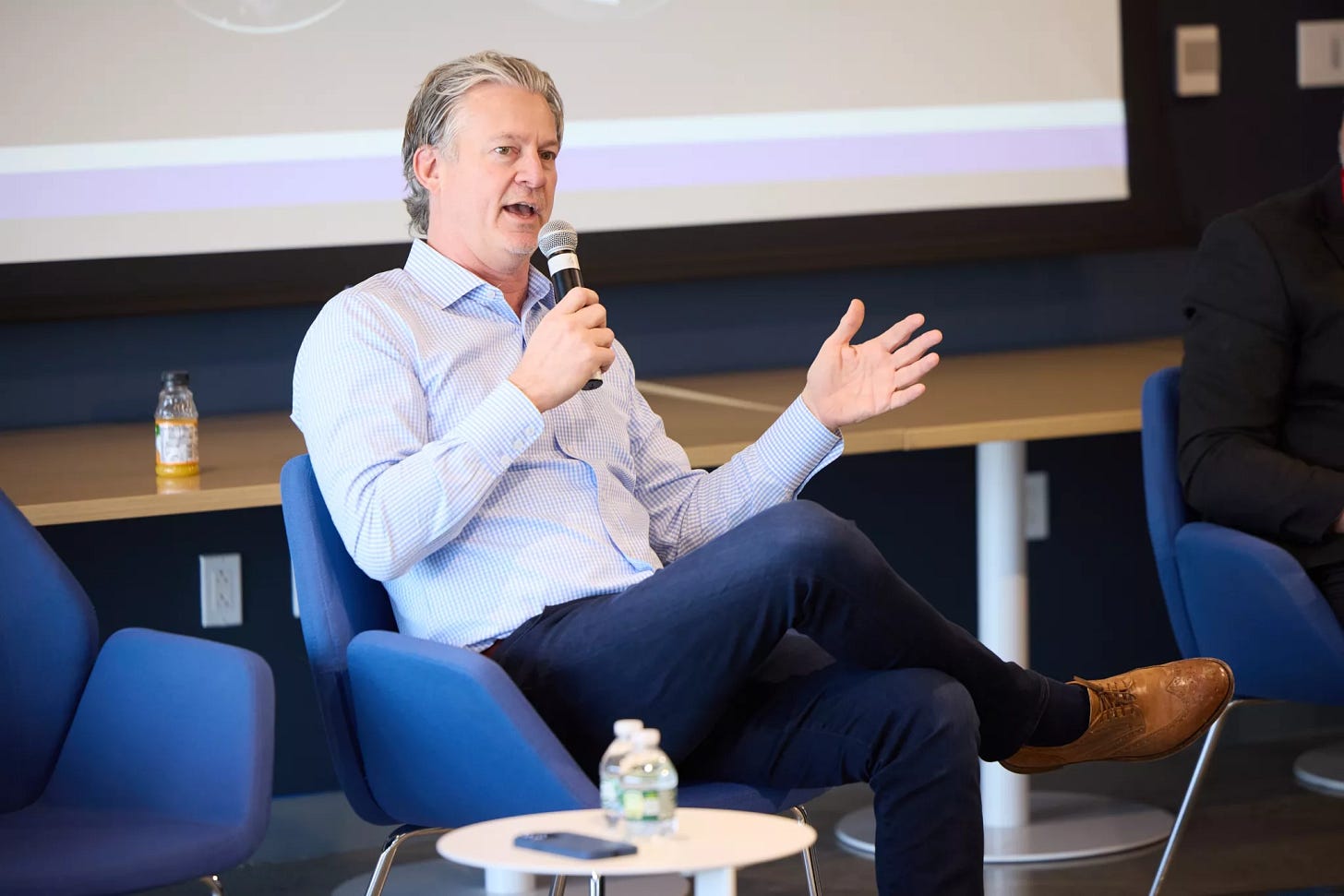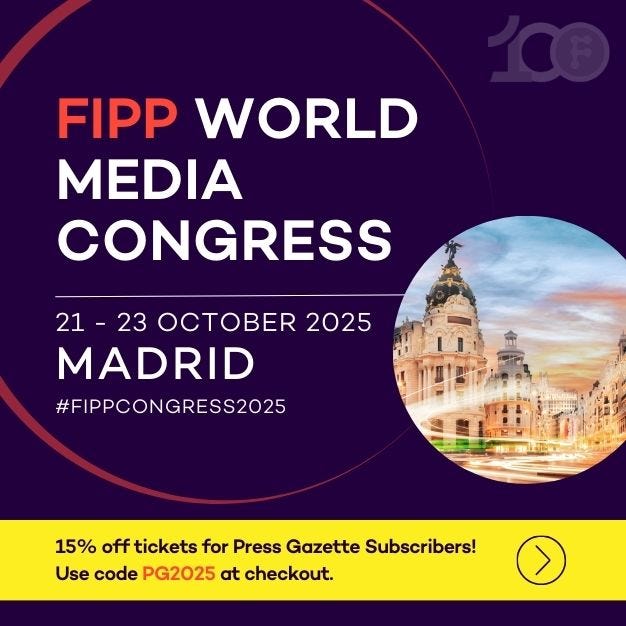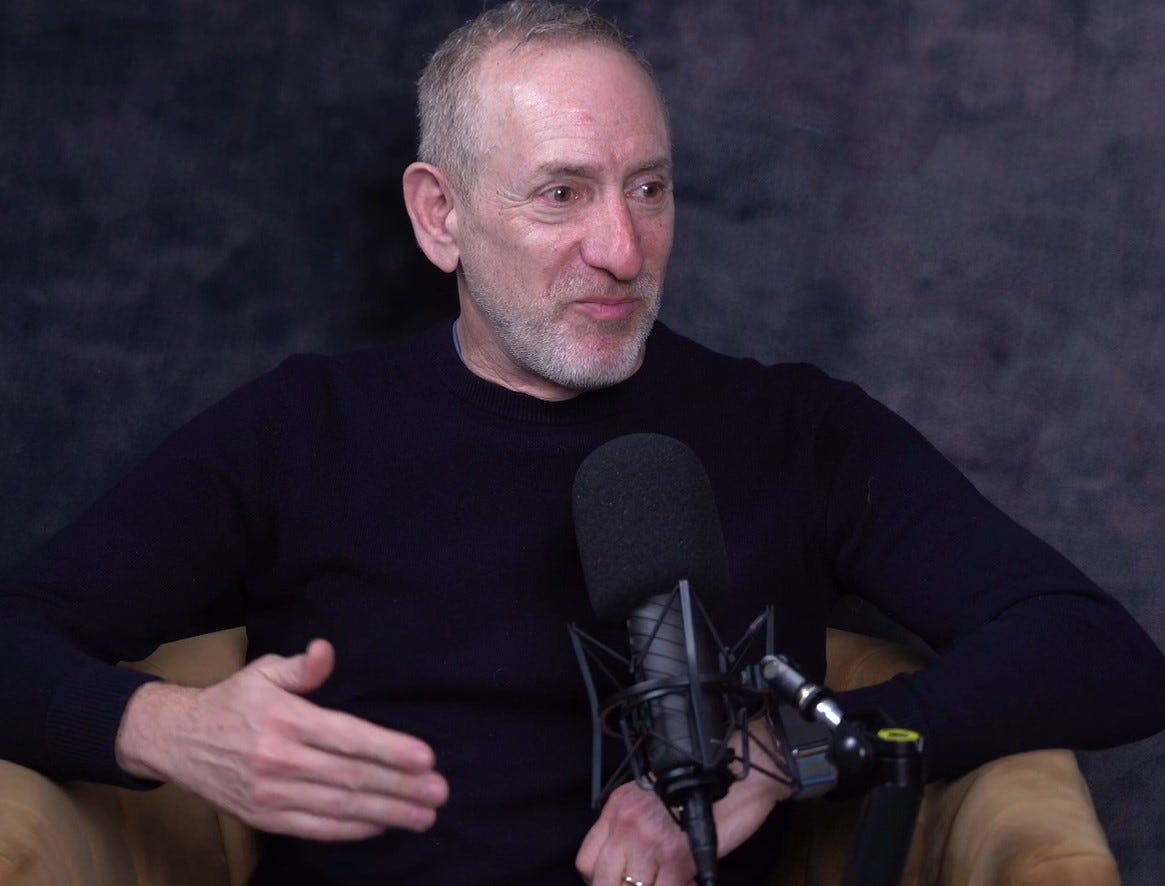Dotdash Meredith CEO Neil Vogel reveals why legacy media is not just a story of decline
And National World sees profit and revenue growth in 2024
Good morning and welcome to your daily Press Gazette media briefing on Friday 21 March, brought to you in association with the FIPP World Media Congress 2025, where the brightest minds in media, publishing, and content come together to shape the future.
Today I offer you the latest in my series: why legacy media is not just a story of decline.
To make the case I offer you an interview with Dotdash Meredith CEO Neil Vogel, who I met at last week's Press Gazette Media Strategy Network conference in New York.
Vogel prints more magazine copies than you can shake a stick at as the CEO of the largest print and digital publisher in the US. But the revenue and profit lines are all heading upwards.
Dotdash Meredith was formed out of the $2.8bn merger of online publisher Dotdash and magazine giant Meredith in December 2021.
The tech wizards and investment banker types at Dotdash appear to have found a way to make legacy media work that does not involve cutting costs faster than revenue decline (UK media CEOs take note!).
They made some tough decisions in the early days, closing a number of titles. But today Vogel is all about loving the brands and making money out of readers in a respectful way. It is a lot different to the 'consent or pay' approach many UK titles are now taking when it comes to the reader-tracking cookie technology that still underpins most online advertising revenue.
DDM's success is largely down to its in-house D/Cipher ad-targeting technology, which uses what people are reading (rather than who they are) to decide what adverts to target them with. The big downside is that D/Cipher works when you are looking for a recipe, or health advice, but not when you are reading general news.
Vogel's upbeat assessment on the state of media is at any rate a breath of fresh air and his insights into management philosophy and strategies are well worth your time.
Today we also have the latest National World results as the future of the UK's third-largest regional news publisher remains in question. Shareholders have agreed a £65m takeover of the company by Malcolm Denmark's Media Concierge but it has yet to be okayed by regulators in Ireland (read our backgrounder on the deal here).
The final scores for 2024 at National World look pretty promising overall with revenue up (no mean feat in the regional newspaper world) albeit helped by acquisitions.
Two lines stand out for me: National World’s investment in Will Lewis-founded Gen Z newsbrand The News Movement has been written down from more than £1m to zero.
And automation has led to a 20% reduction in headcount at the company in four years. So much for those who keep telling us the robots are not coming for our jobs.
Enjoy your weekend when you get there.
From our sponsor
Celebrating 100 years of media innovation, the FIPP World Media Congress 2025 is where global media leaders, digital pioneers and content creators come together!
What to expect?
- Future focused strategies
- Insightful discussions
- Numerous networking opportunities
- Exclusive workshops
From AI to audience engagements, revenue models to revolutionary storytelling, this is where the industry's next chapter begins.
When: 21 – 23 October 2025 | Madrid, Spain
Be a part of the conversations.
On Press Gazette

Dotdash Meredith CEO Neil Vogel: ‘If you make yourself essential, you will be fine’
CEO of the biggest print and online publisher in US reveals key changes which made the business work.
Acquisitions and video advertising drive National World 9% revenue growth
National World writes down value of investment in The News Movement to zero.
News in brief
BBC presenter Jo Coburn is stepping down from Politics Live and leaving the broadcaster after 28 years. (Press Gazette)
A former executive editor and managing editor of The Washington Post jointly emailed owner Jeff Bezos last month urging him to fire chief executive Will Lewis as "a crucial first step in saving" the paper. (The New York Times)
The Competition and Markets Authority has fined Sky, BT, IMG, ITV and the BBC for colluding over pay for sport broadcast freelances, including camera operators and sound technicians. (Financial Times)
A big tech industry organisation whose members include Apple, Meta, Google, X and Amazon has asked the Trump administration to push back on Australia's news media bargaining code, calling it a “coercive and discriminatory tax that requires US technology companies to subsidise Australian media companies”. (The Guardian)
Bluesky has made it easier for publishers to track referrals from the platform. (Techcrunch)
Canada's Conservative party will not allow journalists to travel with the party leader during the upcoming general election, "ending a decades-old tradition" according to CBC. (CBC)
The New York Times will maintain a successor to FiveThirtyEight's poll aggregator after Disney and ABC News shut the data site down. (NYT)
The New Yorker is contesting a judge's order to hand over the reporting materials for a profile of a man whose wife is accused of killing their children. The magazine's lawyer called the order "chilling and directly contrary to the First Amendment". (The Boston Globe)
Radio Free Europe/Radio Liberty are suing the US Agency for Global Media after their federal grant funding was terminated at the weekend. It argues the funding "is not an optional choice for the agency to make. It is the law". (Politico)
Chicago Sun-Times reports 30 of its staff are leaving in buyouts first announced in January, including 23 from its newsroom, with a further five people leaving sister title WBEZ. (Press Gazette)
Digital media company Ziff Davis has acquired newsletter-led women's news and lifestyle publisher The Skimm and all of its reported more than 75 staff are expected to stay on. (Axios)
Vice Media has acquired a LA-based commercial and music video production studio London Alley Entertainment. (Variety)
Also on Press Gazette:
Brand safety woes continue and the coming storm on AI litigation
Daily Mail US editor: Reader loyalty is brand’s biggest asset
Publishers seeing ‘concerning trends’ from advertisers in current political cycle
Newspaper ABCs: Daily Mirror drops below print circulation of 200,000
Independent launching AI-powered news service for ‘time-poor audiences’
Gamified app Newsreel aims to lure ‘news curious’ Gen Z away from Instagram
Telegraph pays ‘substantial’ libel damages to tech entrepreneur
Latest Press Gazette podcast
Latest podcast: Generative AI could spell doomsday or a be a big pay day for publishers
Press Gazette editor-in-chief Dominic Ponsford caught up with New York-based publishing consultant Matthew Scott Goldstein (MSG) to talk about the future of news in the era of AI.
How concerned should publishers be about the threat posed to their business models by generative AI? It’s a 9.9 out of ten said MSG.
He explained why generative AI could spell the end of the road for publisher websites, but why it could also lead to a huge payday for the creators of quality content.






